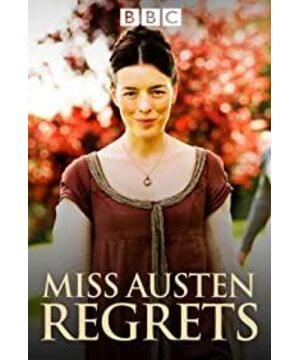The film "The Regrets of Jane Austen" cannot be watched several times in a row. It is too heavy and too real. It shows Jane Austen's life that people who love her can't bear to look directly. It is a solid representation of the poverty, loneliness and loneliness of Austen's last years of life, and of course Jane Austen's own pride and modesty that will not be diminished by the passage of time.
At the age of 30, her life has become dull. Occasionally one or two new acquaintances with young men is a turning point and a surprise, but it is not enough to change her destiny. Although the spring heart seemed to be a little turbulent again, because of her smart and quick mind, she could quickly inspire relaxed and provocative words, and she could immediately enter into the ambiguous atmosphere that young people often have, but she still couldn't stop her. Due to lack of practice for a long time, like a slightly rusted gear occasionally can not handle the rotation. Wise people are self-aware. Faced with this situation, retreating despite difficulties is one of the ways to protect oneself—perhaps not the wisest one, but the one that works. When the young doctor showed more interest in his niece and "abandoned" Jane Austen, whom he had been obsessed with before, when he seemed half-hearted, Austen retreated with reason. Although I am glad for my judgment and decision, the disappointment and loneliness cannot be concealed. At the same time, as the stinger stings her, there is also the correctness of the thesis that "no matter how wise a woman is than a young and beautiful woman". Perhaps using words and language can prove the importance of wisdom and beauty, which is what she is good at, and men will also echo and even sincerely appreciate her talent for debating. But in reality, in the eyes of men, it seems that they don't value the result of this debate at all. So she looked at the face she had thought was an angel, the man who had expected a marriage proposal from him to change her life, and now she looked intently at the man whose niece fanny played the piano, drank his glass of wine, and whispered to him Saying, more like talking to himself, "You'll find the perfect wife, with all the obedience and loyalty, I want her to be silent and a little ignorant, and afternoon tea like cold beef patties and green tea." , and not the one who was destined.
The imaginative and romantic heart is not yet dead, living in a body that is no longer young, it seems like a kind of irony, and this irony is an inescapable wound for Jane who has always won with wisdom and mind. pain. Being ridiculed by the neighbors and even from their mothers, they can still be dismissed at a young age, knowing that they are a group of lay people; , How can a woman with high spirits be patient? If it is an ordinary person, he must no longer continue to be willful when he was young, and even he will think it is rebellious and marry someone obediently. "Love is beautiful, and money is essential", and they will all believe in the end. However, Jane is no ordinary person. She doesn't live by worldly standards, she lives for what she believes in. The old woman with her grandson can laugh at her, the young niece can laugh at her, of course these words can hurt her, but nothing can change what she believes in: in marriage, love is the most important part, But not the only components, there are money, status, and family, but also friendship, passion, and shared goals. Jane Austen has pursued her whole life and searched her whole life. No one can meet all the conditions, and none of them are even slightly suitable, so she did not agree to any of them. The man she loved and still loves, but rejected his proposal, Mr. Bridges, once asked her, "Do you regret it, tell me you once thought of me in the dead of night, tell me that even if all this It's not true." Faced with the worrying question, Austin evaded, and she weakly asked, "Is all this still important?"
So lonely and old, still poor and helpless, is it the final result of Jane's persistent pursuit for many years? If you got married, even if the other party has no money, or no love, no friendship, passion and common goals, life must be tragic, but must it not be as good as it is now? If the price of freedom is loneliness, illness and still poverty, would she still insist on it?
The rejection of marriage time and time again is her own persuasion. This persuasion is a combination of reason and emotion, like a fiery whip, whipping her to wake her up, to pain her, and to relieve her. At the beginning of the film, Jane rejects Harris' marriage proposal. On the carriage back home, Jane prayed to heaven with mixed feelings, "Tell me that my choice is right, and that it is also right to change my mind. Dear God, please don't let me regret what I did today for the rest of my life." Women are in contradictions all their lives, many of which are made by themselves, but no matter what the choice is, none of us can guarantee that it is correct and that there will be no regrets. After seeing the half-hearted face of the young doctor, Jane, who can't sleep at night, came to the living room to have a fire, and what the old maid said to her is precisely the core theme of the movie. Remember what the maid said, "Passion is the preserve of young people, and it fades quickly. Comfort is always there, friendship lasts, if you're as lucky as I am. It's all luck that a marriage is happy, but we still choose who we choose." Trouble. Lovers will still die and money will be gone, but every woman, old maid, wife, widow, every woman will have regrets. So let's read the heroine in your novel, regain youth, fall in love again, Full of hope, it seems we can start again. It's a gift from God, and I think that's enough." No woman has her own mind and can't change that, be it ignorant or wise, noble Or humble, whether ordinary or great. No woman can see through her own life and other women's lives, because you have not experienced other people's life, you do not know the ups and downs. Austen has never been married, and in a sense she has no right to assert that married life is boring, marital love will fade to nothing, and passion and vitality will be wiped out with the trivialities of life. At the end of the day, most importantly - she would lose her ability to write because she would have nothing to see or hear to inspire. But she might be wrong, remember what Jane's mother said to Henry and fanny, "It's not like it's written in a novel, fanny, a novel always ends with a wedding, and all the fun happens after the wedding. It's like no matter what. The more you love your husband, the more you will love your own children." Maybe there are some things Jane doesn't understand!
Jane Austen's rationality keeps her away from mediocrity and ignorance in the general sense. She has avoided leaving regrets all her life, so she struggles and refuses to marry easily - but it is precisely because of this arrogance that her youth is wasted, and there seems to be some Have true love. In the end, no matter what, she left regrets, irreparable regrets. And how do we, as women, know what we don't know? How to face sudden feelings to persuade yourself or others? How do we distinguish between right and wrong, how do we distinguish between miss, regret and true love? Love is the subject of a woman's life!
View more about Miss Austen Regrets reviews











